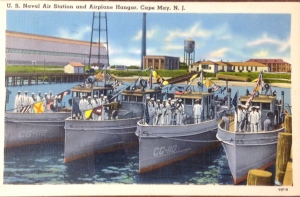The war years were particularly problematic for Cape May, with tourism once again reduced by a global crisis. Though the U.S. Coast Guard had been stationed in Cape May since 1925 at Naval Air Station Section Base No. 9, in 1940, the Navy recommissioned the airfield. By 1942, the Navy commissioned the Naval Base Cape May and established its administrative headquarters at the now-abandoned Hotel Cape May in the failed East Cape May section of the city. While the Navy’s presence allowed Congress Hall to survive the war years, with the hotel reporting that it was completely booked throughout the summer seasons, a growing fear of German submarine warfare detracted out-of-town visitors. Many believed the Navy’s presence in Cape May confirmed rumors that the Jersey Shore was a target for German U-Boats. Although not as dire as some reports might have suggested, the threat of the German submarines were real, as emphasized by the 1945 capture of U-848 off the coast of Cape May. Between these fears, a ban on pleasure driving, and reduced rail service, Cape May rarely hosted out-of-town vacationers during World War II.
Surrender of German U-Boat 858 Off Coast of Cape May, 1945.
Fortunately, servicemen maintained a constant presence in Cape May’s hotels. The center of Cape May’s nightlife, Congress Hall hosted several galas and its cocktail bar was consistently crowded on weekends. Though the hotel experienced five profitable years during the war, by 1946, the Navy pulled out of Cape May, leaving Congress Hall’s new owner, Joseph B. Uhler, to develop a new strategy for attracting vacationers. An experienced hotelier, Uhler’s leadership would push Congress Hall into modernity, hoping to compete with Wildwood, a newly popular resort just ten miles north of Cape May.
